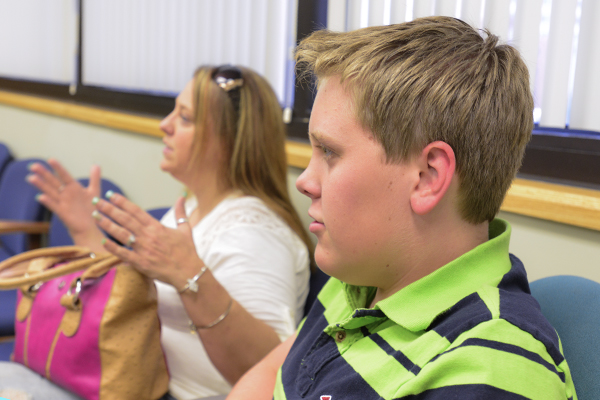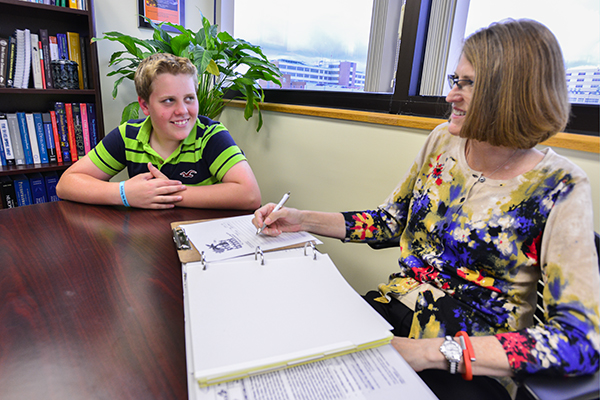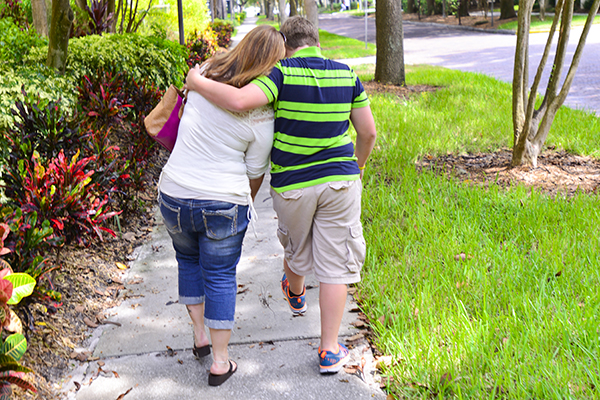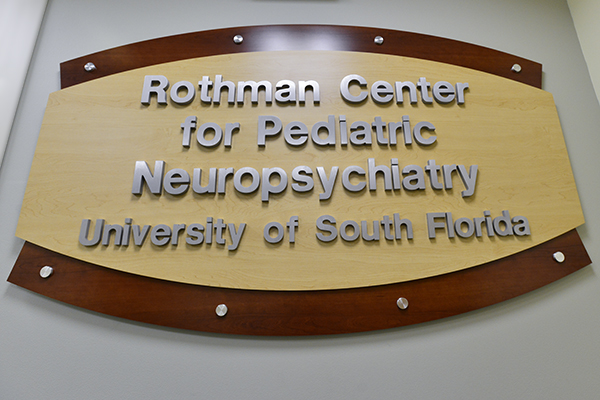Elijah Lindall calls himself the Breakthrough Kid.
The name refers to a point in some clinical trials when a medical treatment proves to be so effective it can be made available to all patients in need.
Elijah is taking part in USF clinical trials for medications that might ease symptoms of Tourette syndrome. There is currently no cure for Tourette syndrome. Some medications have some positive effects on some patients, but truly effective medications remain elusive. He knows it’s an ongoing process, possibly taking years. But he’s hopeful that he is part of the study that finds “the one.”
“I’m kind of nervous about how long it might take, but excited that I can help,” Elijah said.
***
Elijah was 4 when his parents suspected something was wrong and 7 when the family finally found out why he wrung his hands throughout the day, repeated phrases, and had nearly constant tics.
Elijah has Tourette syndrome, a neurological disorder characterized by repetitive, involuntary movements and vocalizations called tics. Early symptoms of Tourette’s are typically noticed first in childhood, usually between the ages of 3 and 9, and occur in all ethnic groups. Males are affected about four times more often than females.

“We saw five doctors before we got a diagnosis,” his mother Maria Robinett said. “Until then, we hadn’t found anyone who could tell us definitively what was going on.”
As comforting as it was to finally know Elijah’s condition, his diagnosis did not equate to treatment and three more years passed. The moment when real hope appeared, Maria said, was at a local event aimed at raising awareness for Tourette’s. That was when they met Dr. Murphy.
***
Tanya Murphy, MD, is professor of pediatric psychiatry and director of the USF Rothman Center for Pediatric Neuropsychiatry, located on the All Children’s Hospital Johns Hopkins Medicine campus in St. Petersburg. She is an expert on Tourette syndrome and part of an interdisciplinary team of healthcare professionals specially trained in pediatric neuropsychiatry. The Rothman Center, located in St. Petersburg, is at the forefront of treatment and research for Tourette’s, as well as other psychiatric conditions affecting children (see below).
In essence, connecting with Dr. Murphy put Elijah at the epicenter of Tourette’s research in the region.
Tourette’s has historically been understudied, Dr. Murphy said, but recently there’s been an increased interest.
“We’re wrapping up several trials and several more are coming up, so things are taking a turn for the better,” she said. “It’s only when there is a concerted focus to find answers that we begin to make greater strides forward and help the most patients.”
Her research is not only about new medications. Interestingly, she said, there has been evidence showing that other medical issues might be causing the tics.
“We’ve found various issues that might be involved, including infections, allergies, celiac and thyroid disorders, which means more work is necessary at the basic science level,” she said.
In addition to the potential for finding a medication that would ease, or even stop, his symptoms, the expert team at the Rothman Center also helped arm Elijah with ways to manage his nearly constant tics, using habit reversal therapy techniques to steady his hand as he writes school assignments and control his drive to repeat phrases over and over.
Seeing improvement in how he gets through his day, Elijah has been inspired to take a more active role in educating others about Tourette’s. He gives talks about his condition to other children and plans to apply to become a youth ambassador for the Tourette Syndrome Association.

Elijah with Rothman Center Director, Dr. Tanya Murphy, who holds the ACH/USF Maurice A. and Thelma P. Rothman Endowed Chair in Developmental Pediatrics
“Elijah is a great advocate for Tourette’s and the consequences for people who have it,” Dr. Murphy said. “He and a couple of other patients have committed to the program to find new treatments. They are both giving beyond themselves and doing it for themselves.”
***
There are misconceptions with Tourette syndrome, Dr. Murphy said.
The stereotype is of someone who has frequent outbursts of vulgar and inappropriate words. But in reality, that tendency is uncommon for children and adolescents.
“For most children, the signs are much more subtle, with simple movements like eye blinking, squeaking, arm jerking and facial movements,” she said.
It is also often thought that Tourette syndrome can be a chronic condition with symptoms lasting a lifetime. But a lot of children get better as they get older. In general, one third gets better, one third stays the same and one third has chronic, on-going issues, Dr. Murphy said.
And living with Tourette’s into adulthood does not equate to an unfulfilled life.
“Tourette’s can be mild or derailing, but most people with Tourette’s can be as equally effective in life as those without,” Dr. Murphy said, citing Tim Howard as an example. Living with chronic Tourette syndrome since childhood, Howard went on to be an amazing goalie, helping the U.S. team reach the final rounds in the World Cup. During the match, he broke the record for most saves in a World Cup match with 16. He was also named Major League Soccer Humanitarian of the Year in 2001 for his work with children with Tourette’s.
***
Elijah is doing well in school. At one point, the hand wringing got in the way of his writing, so he found a solution by asking teachers if he could type most of his work. Math remains an encumbrance that he’s working to improve.
He also continues to play defense in soccer and third base in baseball. Now in his 11th year of baseball, he’s playing up, meaning he’s good enough to play with a high school team even though he’s in middle school.
Although improved since finding the Rothman Center at age 10, his arms still twitch and he continues to repeat words and phrases frequently, so he continues with appointments at the Rothman Center. Like most people with Tourette’s, Elijah also has obsessive-compulsive disorder and anxiety, although his are not severe. Because the Rothman Center has an interdisciplinary team, he sees other clinicians for his associated disorders.

What Dr. Murphy and the Rothman Center were able to provide Elijah was access to clinical trials, improvement in managing his symptoms and hope.
“Elijah has said he will probably tic forever, but we know he really wants it to go away,” Maria said.
“We’ve been very happy coming here. It was a relief to find such a great resource for families like ours.”
The USF Rothman Center
Thelma Rothman and her family have been long-time supporters of our community’s children. Mrs. Rothman, who passed away Oct. 7, 2014, joined the ACH Hospital Board in 1982 and later served as its chair. She was the first chairperson of the All Children’s Foundation Board and later chaired the All Children’s Hospital Health System Board of Directors. She and her late husband, Maurice Rothman, founders of Kane’s Furniture, had a strong interest in children’s developmental and learning problems. They established the Rothman Chair to promote research as well as early interventions and treatment in these areas.
Dr. Tanya Murphy holds the ACH/USF Maurice A. and Thelma P. Rothman Endowed Chair in Developmental Pediatrics and directs the Rothman Center, which is in dedicated space in the All Children’s Child Development and Rehabilitation Center.
A specially trained team of experts at the Center helps provide a range of services, including cognitive-behavioral therapy, habit-reversal training and pharmacological and medical management of an array of disorders, including autism spectrum disorders. Habit reversal training, a behavioral method for managing tics or hair pulling behaviors, has shown promise in Tourette syndrome patients. The Rothman Center has a significant research focus on patients with Tourette syndrome, obsessive-compulsive disorder, autism spectrum disorders and trichotillomania (hair pulling).
The USF Health Morsani College of Medicine was recently selected as a Tourette Center of Excellence by the Tourette Syndrome Association as part of the Southeast Regional Center of Excellence Network. In addition, the Rothman Center is a member of the USF Neuroscience Collaborative, an ambitious program designed to accelerate progress in USF neuroscience research.


